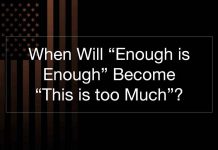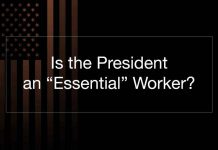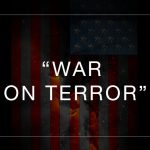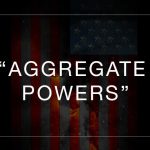Last Updated on January 22, 2021 by Constitutional Militia
Only in rare instances have I prepared a commentary for NewsWithViews in response to something which someone else has been published elsewhere. But a recent column by John W. Whitehead, entitled “There Will Be No Second American Revolution: The Futility of an Armed Revolt” (18 July 2016), has received such generally favorable attention on the Internet that it seemed meet for me to fashion a few dissenting remarks for the record. As Mr. Whitehead’s article is fairly long, I cannot address all of the points he makes. Therefore I encourage my readers to review his article for themselves. After they do so, they can judge whether the following critique is just.
Mr. Whitehead’s article begins by rehashing in great detail (for he is a keen student of these matters) the rapid development and deployment of a national para-militarized police-state apparatus in this country during the recent past. His description of events contains little that most perceptive observers have not already noticed. But Mr. Whitehead draws from these dismal facts the distressing conclusion that “[t]he powers-that-be want us to feel vulnerable. * * * Most of all, the powers-that-be want us to feel powerless to protect ourselves and reliant on and grateful for the dubious protection provided by the American police state. Their strategy is working.”
On that point, Mr. Whitehead waxes emphatic: “There will be no second American Revolution. There is no place in our nation for the kind of armed revolution our forefathers mounted against a tyrannical Great Britain.” Of course, that is precisely what many people at the time said about the first “American Revolution”, only to be proven wrong by its outcome. So, as a lawyer by trade, Mr. Whitehead should not feel too secure in the face of the adverse precedent which he himself cites. In any event, Mr. Whitehead presents a rather disquieting argument:
The message being sent to the citizenry [by the powers-that-be] is clear: there will be no revolution, armed or otherwise.
Anyone who believes that they can wage—and win—an armed revolt against the American police state has not been paying attention. Those who wage violence against the government and their fellow citizens are playing right into the government’s hands. Violence cannot and will not be the answer to what ails America.
Whether instigated by the government or the citizenry, violence will only lead to more violence. It does not matter how much firepower you have. The government has more firepower. *****
* * * [B]y generally making peaceful revolution all but impossible, the government has engineered an environment in which domestic violence has become inevitable. What we are now experiencing is a civil war, devised and instigated in part by the U.S. government.
The outcome for this particular conflict is already foregone: the police state wins.
The objective: compliance and control.
The strategy: * * * when all hell breaks loose, clamp down on the nation for the good of the people and the security of the nation.
An underlying difficulty with these pronouncements is that “the government” to which Mr. Whitehead loosely refers is not, in fact and law, “the government” at all. (As a lawyer, he should know as much, and try to craft his language accordingly.) From the constitutional perspective, “the government” is that set of actions by individuals in public office which is consistent with their lawful powers and disabilities. No “government” in this country is empowered to set up a police state, to “devise[ ] and instigate[ ]” a “civil war” amongst its own people, to enforce “compliance and control”, or to “clamp down on the nation” for any reason. To be sure, rogue public officials may attempt to engage in such usurpation and tyranny—but in the perpetration of such misbehavior they are acting not in the capacity of “the government”, but in the capacity of lawbreakers.
Even leaving aside Mr. Whitehead’s imprecision as to what constitutes “the government” in this country, what must one conclude is “the bottom line” of his argument? That the powers-that-be intend to foment widespread violence as their excuse for the “final solution” of thoroughly subjugating the American people, and then oppressing them without limit! So, according to Mr. Whitehead himself, there will be a “second American Revolution” after all—instigated, interestingly enough, by the police state’s provocations, just as the first “American Revolution” was to a great degree instigated by provocations emanating from “a tyrannical Great Britain”. Indeed, America is already in the midst of this “civil war”. But, this time, the patriots are fated to lose the “American Revolution”, no matter what. All of us have already been defeated before the battle has even been joined, and therefore should sheepishly accept our fate, no matter how dire it may be.
Rather than acquiesce in Mr. Whitehead’s unpleasant fantasy, I must point out that “no matter what” is the critical factor in any analysis of this kind. And I suspect that he (in his own words) “has not been paying attention” to recent developments. As a lawyer, he should consider the evidence for the defense, as well as for the prosecution, before he makes his plea to the jury.
The fact is that Americans—indeed, people throughout the civilized world—are waking up to what the powers-that-be are planning for and doing to them. Here at home, what I might label “the Trump Phenomenon”, even with all of its obvious faults, demonstrates a widespread, profound, and intransigent disgust among ordinary Americans with careerist politicians, bureaucrats, police-state operatives, propagandists in “the mainstream media”, and the shadowy “powers-that-be”(especially in the big banks and Wall Street’s financial casinos) who pull the strings from behind the screen. So if the powers-that-be imagine that they can easily impose a full-blown police state on a population of millions of people increasingly aware of and fed up with their corruption and criminality, they are playing with fire.
Once the powers-that-be have lifted the lid of Pandora’s Box through what Mr. Whitehead describes as “a civil war, devised and instigated in part by the U.S. government”, how could they know, let alone how could they be sure of their ability to control, what might leap out? For example, can anyone unerringly predict how individual Americans, in thousands of different situations across this country, will react when agents of the police state start seizing firearms, persecuting dissenters for “sedition” and “anti-government hate speech”, and rounding up leaders of opposition movements for incarceration in secret prisons and camps? Easily foreseeable, though, is that many of these and other targets of police-state repression will know perfectly well that they have nothing to lose by resisting, and will act on that understanding of their plight. So, even were Mr. Whitehead correct in his assertion that “[v]iolence cannot and will not be the answer to what ails America” in general, the victims of police-state oppression will doubtlessly believe that violence is their only recourse in particular. After all, would not armed resistance, no matter how desperate, be preferable to consignment to slow death in a forced-labor camp, let alone to simply being murdered out of hand by the police state’s psychopathic storm troopers? Can the powers-that-be really expect to prevail against millions of people, spread across an entire continent, who not only despise them but also have nothing to lose by resisting their aggression? Would even Mr. Whitehead himself simply “go along quietly” when they came for him?
Mr. Whitehead is, of course, correct to observe that the burgeoning “American police state” disposes of many “boots on the ground”, possessed of a great deal of raw “firepower”. Nonetheless, in a nationwide crisis in which (as he predicts) widespread “domestic violence has become inevitable”, could the powers-that-be depend upon these forces? Might not a significant part of them change sides and support the people, or set itself up as some sort of third force looking out solely for its own interests? Moreover, even in the absence of defections, could the powers-that-be really expect that their armed forces could subjugate the entirety of the United States, when the parts of those forces wielding the most “firepower” have been unable to defeat gaggles of rag-tag troglodytes in Afghanistan, or pick-up teams of hired terrorists such as “Al-Qaeda” or “ISIS” running loose in the sand boxes of the Middle East?
To be fair to Mr. Whitehead, he does not recommend that we all should simply start unreservedly to “love Big Brother”. Rather, he proposes a kind of subterranean revolution:
If there is any hope of reclaiming our government and restoring our freedoms, it will require a different kind of coup: nonviolent, strategic and grassroots, starting locally and trickling upwards. Such revolutions are slow and painstaking. They are political, in part, but not through any established parties or politicians. Most of all, * * * for any chance of success, such a revolution will require more than a change of politics: it will require a change of heart among the American people, a reawakening of the American spirit, and a citizenry that cares about their freedoms more than their fantasy games.
To this, a skeptic might object that such a program would likely entail efforts spread out over ten, twenty, or fifty years at least—when the real issue is what Americans should do right now that might pay dividends right now, or at least in the reasonably foreseeable future.
Furthermore, to be effective for “reclaiming our government and restoring our freedoms”, such “change” and “reawakening” will presumably need to manifest themselves at some definite point in time in some sort of open collective action with manifest political goals. And just what will the supremely powerful, irresistible “American police state” be doing while the denizens of this country are changing their hearts and reawakening their spirit for the very purpose of overthrowing the powers-that-be? Well, Mr. Whitehead himself informs his readers that “[t]he message being sent to the citizenry [by the powers-that-be] is clear: there will be no revolution, armed or otherwise.” So, according to his very own analysis, his own proposal of “a different kind of coup”—the course of action which he describes as the only one with “any chance of success”—is a hopeless pipedream. Nothing can be done—not now, not ever.
Well, not really. The fundamental fault in Mr. Whitehead’s proposal is not just that it is utterly unrealistic in terms of the time necessary to put it into practice, or that it offers no strategy for dealing with the predictable reactions of the powers-that-be. In addition to those demerits, it contains no suggestion as to what institutions Americans should employ for “reclaiming our government and restoring our freedoms” once the requisite “change of heart” and “reawakening of the American spirit” have occurred. Had Mr. Whitehead given thought to those institutions, he might have realized that the most important steps for “reclaiming our government and restoring our freedoms” need not be put off until the distant future, but might be taken in the present.
Now, I do not predict, let alone advocate, and for various prudential reasons would not welcome a “second American Revolution”. I believe—and, as my readers are well aware, have consistently emphasized over the years (and shall point out once again here)—that America’s present malaise can be cured without recourse to “revolution” or any sort of widespread violence or other political or social upheaval. The Constitution already provides the necessary and sufficient means for dealing peacefully yet decisively and permanently with the problem which so discomforts Mr. Whitehead.
The critical danger confronting America is a burgeoning domestic police state. No one doubts that. One may debate how close to complete domination of the populace this apparatus has come to date. I submit that it is still far from achieving such control—or commentaries such as this would already be prohibited from publication, on the Internet or anywhere else. The opposite—indeed, the antagonist—of “a police state” is “a free State”. Therefore, if “a police state” is to be suppressed while there is still time, “a free State” must be supported immediately if not sooner. What institution does the Constitution declare to be “necessary to the security of a free State”? Do I really need to recite all of the first thirteen words of the Second Amendment?
The question to which I should appreciate a straight answer from someone is: “Why do people such as Mr. Whitehead persist in disregarding the Constitution on this point, when it is as vital as it is obvious?” Why, through their studied silence, do the members of what Joseph Schumpeter aptly described as “the chattering class” deny or cast doubt upon the truth and the urgency of those thirteen words when “a free State” in America is under open, incessant attack from the architects and practitioners of “a police state”? What betokens such silence from people whose inclination (if not actual business) it is to talk, and that volubly, about every other issue? Is their implicit message that Americans are to disbelieve whatever the Constitution says? Or that the first thirteen words of the Second Amendment were wrong in 1791? Or that they are wrong now? Or that they are simply out of date, and needful of being reinterpreted into irrelevance or oblivion according to the perverse precepts of “the living Constitution”?
Most perplexing to me is why “the chattering class” seems incapable of comprehending that under the Declaration of Independence and the Constitution no dichotomy can possibly exist between the American people, on the one side, and “the government”, on the other. WE THE PEOPLE are not outside of “the government” and subject to its unfettered control. Rather, WE THE PEOPLE are the very source of “the government”, and are (or should be) direct participants in “the government”, day in and day out, through the most puissant force of “government” imaginable: the entire community exercising the Power of the Sword through the Militia. So, were the Militia functioning as they should, no one would be worried about “the government’s” setting up a national para-militarized police state, because— pursuant to the constitutional authority and responsibility of the Militia “to execute the Laws of the Union” (and of their own States as well)—the Militia would perform or supervise all “police” functions at every level of the federal system. WE THE PEOPLE would no longer distrust, let alone fear, the police, because WE THE PEOPLE would be the police.
If revitalization of the Militia might figuratively be characterized as a “second American Revolution”, it would be a “revolution” without any necessity for what Mr. Whitehead decries as “an armed revolt”. For it would hardly amount to any sort of “revolt” for Americans to revitalize the very institutions of government which, from the foundation of this country, the Constitution has declared to be “necessary to the security of a free State”. The “revolt”, if any there were, would be on the part of rogue public officials who attempted to prevent WE THE PEOPLE from asserting their supreme governmental authority through the Militia.
In the title of his article, Mr. Whitehead applies the word “futility” to “an armed revolt”. He would have done better to recognize the “futility” of disregarding how the first thirteen words of the Second Amendment unerringly point the way towards dealing once and for all with “the American police state”. For if by definition “a police state” cannot exist within “a free State”; and if “[a] well regulated Militia” is “necessary to the security of a free State”; then “a police state” cannot exist in the presence of “[a] well regulated Militia”. Where “[a] well regulated Militia” exists, the only individuals confronted with “futility” are those who attempt to set up “a police state”.
All that remains to be considered, then, is the practical question of whether an attempt to revitalize the Militia would inevitably prove futile under present political, social, and cultural conditions. Nay-sayers will assert that it would be difficult, probably impossible, to revitalize the Militia today. But I suspect that, to perform this task, there are enough Americans left who still subscribe to the old saying: “The difficult we do immediately; the impossible takes a little longer.” In any event, why not try? Is the alternative acceptable? In fact, there are many ways to go about revitalizing the Militia, step by step from the bottom up in one State after another—as well as from the top down, if the right individual were the President of the United States.
On the other hand, is the program Mr. Whitehead proposes devoid of difficulty? And even if, after who knows how long, his program were to succeed in bringing about “a change of heart among the American people, a reawakening of the American spirit, and a citizenry that cares more about their freedoms than their fantasy games”, the Militia would still have to be revitalized if “the security of a free State” were to be guaranteed from that point on.
Finally, Mr. Whitehead and those who follow his lead should ponder whether the process of promoting, and then implementing, revitalization of the Militia could itself be the catalyst for “a change of heart among the American people, a reawakening of the American spirit, and a citizenry that cares more about their freedoms than their fantasy games”. For it would be impossible for anyone who participated in revitalization of the Militia not to realize that the Militia embody the original “American spirit” of “a citizenry that cares more about their freedoms than [anything else]”—and not to absorb that spirit in its full strength through that participation. So, if Mr. Whitehead desires to “reclaim[ ] our government and restor[e] our freedoms” through “a different kind of coup: nonviolent, strategic and grassroots, starting locally and trickling upwards”—then he needs to begin thinking seriously about revitalization of the Militia.
©2016 Edwin Vieira, Jr. – All Rights Reserved.




































